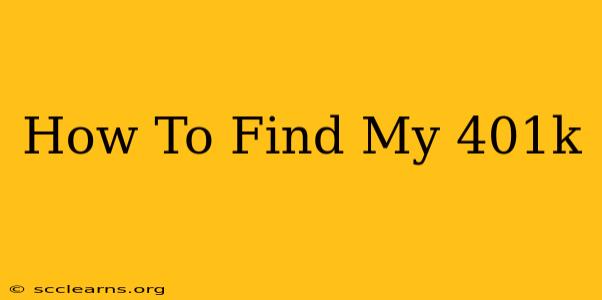Losing track of your 401(k) can be stressful, but finding it is often easier than you think. This comprehensive guide will walk you through several effective methods to locate your retirement savings. Whether you changed jobs, experienced a company merger, or simply mislaid the paperwork, we'll help you track down your 401(k) and get back on track with your retirement planning.
Understanding Your 401(k) Situation
Before we begin the search, let's consider some common scenarios that might lead to losing track of your 401(k):
- Job Change: The most frequent reason for losing track is changing employers. Your 401(k) typically remains with the previous employer's plan administrator.
- Company Merger or Acquisition: If your company merged with or was acquired by another, your 401(k) might have been transferred to a new plan.
- Lost Paperwork: Sometimes, it's as simple as misplacing important documents.
Proven Ways To Find Your 401(k)
Here are several reliable methods to help you locate your lost 401(k):
1. Check Your Old Pay Stubs and Employment Records
Your pay stubs and employment records often contain information about your 401(k) plan, including the plan provider's name and contact information. Review these carefully for clues.
2. Contact Your Former Employer's Human Resources Department
Reach out to the Human Resources (HR) department of your previous employer. They are often a valuable resource and can provide details about your 401(k) plan, including the current custodian or administrator. Be prepared to provide your name, employment dates, and any other relevant information.
3. Utilize Online Search Engines
Use search engines like Google, Bing or DuckDuckGo. Search using keywords such as "[former company name] 401k," "[former company name] retirement plan," or the name of the plan provider if you remember it. You may uncover contact information or details about plan transfers.
4. Check Your Bank and Investment Accounts
Review your bank and investment statements. Sometimes, 401(k) distributions or rollovers might show up unexpectedly in these accounts, providing a hint about the plan's location.
5. Explore the Department of Labor's Website
The Department of Labor (DOL) has resources that may assist in locating lost retirement plans. Their website often provides guidance and potential search tools. While they don't directly locate plans, they can point you in the right direction.
6. Use the National Registry for Unclaimed Retirement Plan Benefits
This registry, operated by the Pension Benefit Guaranty Corporation (PBGC), helps people locate unclaimed retirement benefits. This is a particularly useful resource if your former employer has gone out of business.
7. Consult a Financial Advisor
If all else fails, consider consulting a financial advisor. They have access to various databases and resources that can help locate your 401(k). This is a valuable option, especially if dealing with complex scenarios like company mergers or bankruptcies.
Preventing Future 401(k) Loss
To prevent this situation from happening again, consider the following:
- Keep Detailed Records: Maintain a secure file containing all your retirement plan information, including account statements and contact details.
- Regularly Review Your Statements: Set reminders to review your 401(k) statements regularly, even after leaving a job.
- Consolidate Your Accounts: Consider consolidating multiple 401(k) accounts into a single IRA (Individual Retirement Account) to simplify management.
Finding your 401(k) may require some detective work, but using these methods, you'll significantly improve your chances of success. Remember to be persistent and patient, and don't hesitate to seek professional help if needed. Your retirement savings are valuable – take the time to secure them!

